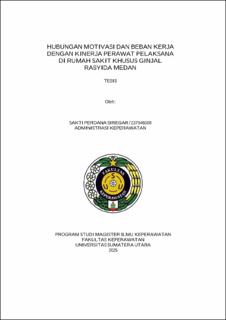| dc.description.abstract | Nurses’ performance plays a crucial role in determining the quality of nursing services in hospitals. Low motivation and high workload are among the factors contributing to decreased performance. This issue has been observed at Rasyida Special Kidney Hospital, Medan, as indicated by insufficient recognition, high work demands, and patient complaints about the quality of care. This study aims to analyze the relationship between motivation and workload with the performance of staff nurses at Rasyida Special Kidney Hospital, Medan. This research employed a correlational analytic design with a cross-sectional approach. The study population included all staff nurses at the hospital, with a total sampling technique resulting in 69 respondents. The research instrument was self-developed by the researcher and had undergone validity and reliability testing. Data were analyzed using univariate, bivariate, and multivariate analyses. Univariate analysis showed that most nurses had moderate motivation (65.2%), high workload (69.6%), and moderate performance (66.7%). The bivariate analysis revealed a significant relationship between motivation and performance (p = 0.001, r = 0.507), as well as between workload and performance (p = 0.012, r = 0.301). These findings indicate a significant relationship between motivation and workload with nurses’ performance. The multiple linear regression test showed a coefficient of determination (R²) of 0.357, meaning that 35.7% of the variance in performance can be explained by the independent variables. The results of this study may serve as an evaluation for the hospital regarding staff motivation and workload. Nurses’ performance can be improved by increasing incentives, providing adequate work facilities, offering recognition, and strengthening professional relationships to achieve optimal healthcare services. | en_US |


